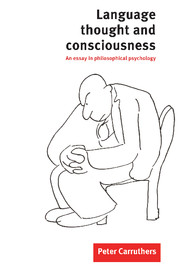Book contents
- Frontmatter
- Contents
- Preface
- Introduction
- 1 The geography of the issues
- 2 Which language do we think with?
- 3 Thought-based semantics
- 4 Holism and language
- 5 First steps towards a theory of consciousness
- 6 Second (-order) steps towards a theory of consciousness
- 7 A reflexive thinking theory of consciousness
- 8 The involvement of language in conscious thinking
- Conclusion
- References
- Index
2 - Which language do we think with?
Published online by Cambridge University Press: 01 June 2011
- Frontmatter
- Contents
- Preface
- Introduction
- 1 The geography of the issues
- 2 Which language do we think with?
- 3 Thought-based semantics
- 4 Holism and language
- 5 First steps towards a theory of consciousness
- 6 Second (-order) steps towards a theory of consciousness
- 7 A reflexive thinking theory of consciousness
- 8 The involvement of language in conscious thinking
- Conclusion
- References
- Index
Summary
I have accepted Fodor's view that prepositional attitudes (beliefs, desires, and so on) are best understood as relations to sentences. The question then is: which sentences? In this chapter, after first considering the evidence from psychology (which is equivocal), I shall present an intuitive, introspection-based, argument for the view that human conscious thinking involves sentences of natural language. This is an initial presentation of the view that I shall wish to defend in this book. I shall then begin to consider Fodor's arguments for claiming that the sentences in question belong to an innate, universal, language of thought (Mentalese). Some of these arguments are easily responded to, but some will require extensive discussion in later chapters.
The evidence from scientific psychology
What does cognitive psychology tell us about the relationship between language and thought? I shall consider the developmental evidence first, and then briefly present and discuss the evidence from neuropsychology, particularly aphasia. I shall argue, in summary, that the scientific evidence is inconclusive, remaining open to a variety of interpretations.
The evidence from normal development
It is an oft-remarked fact that the linguistic and cognitive abilities of young children will normally develop together. If a child's language is advanced, then so will be its abilities across a range of tasks; and if a child's language is delayed, then so will be its cognitive abilities. To cite just one item from a wealth of empirical evidence: Janet Astington (1996) reports finding a high correlation between language-ability and children's capacity to pass false-belief tasks, whose solution requires them to attribute, and reason from, the false belief of another person.
- Type
- Chapter
- Information
- Language, Thought and ConsciousnessAn Essay in Philosophical Psychology, pp. 40 - 72Publisher: Cambridge University PressPrint publication year: 1996



